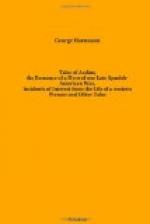As the Indians had no money and nothing else of commercial value to him, he bartered for the trophies of victory which the proud chiefs carried suspended from their belts. Deprecatingly he called their attention to the undeniable fact that these articles had been worn before and had to be rated as second-hand goods. But he hoped that his brother-in-law, Isaac Dreibein, who conducted a second-hand hairdressing establishment in New York City, would take these goods off his hands. This trade flourished for a time, until, as usual, Israel fell off from the Lord, by opening shop on the Sabbath. An unlucky Moses got into a fatal altercation with a Comanche chief, whom he cheated out of a scalplock, as he was as baldheaded as a hen’s egg. Thereat the Indians became suspicious and refused to trade with the Jews ever after.
With proverbial German thoroughness, uncle instructed me in all the tricks and secrets of his profession. He had found that the Mexicans were good buyers, if handled scientifically, for they would never leave the store until they had spent all their money. Therefore, in order to encourage our customers, we kept a barrel of firewater under the counter as a trade starter. One or more drams of old Magnolia would start the ball to roll finely. Our merchandise cost mark was made up from the words, “God help us!” Every letter of this pious sentiment designated one of the numbers from one to nine and a cross stood for naught. When I said to uncle, “No wonder that our business prospers under this mark—God help us!—but say, who helps our customers?” he was nonplussed for a moment, and then he laughed heartily and said that this had never worried him yet.
There was not much money in circulation in New Mexico at that time, as the country was without railroads and too isolated to market farm produce, wool and hides profitably. Mining for gold was carried on at Pinos Altos, near the southern boundary, but the Apaches did not encourage prospecting to any extent. During the period of the discovery of gold in California, in the days of “forty-nine,” the people of New Mexico had become quite wealthy through supplying the California placer miners with mutton sheep at the price of an ounce of gold dust per head, when muttons cost half a dollar on the Rio Grande. At that rate of profit they could afford the time and expense of driving their herds of sheep to market at Los Angeles, even though the Apaches of Arizona took their toll and fattened on stolen mutton.
CHAPTER VI. INDIAN LORE. THE WILY NAVAJO
The principal source of the money supply was the United States Government, which maintained many forts and army posts in the Territories as a safeguard against the Apache and Navajo Indians. During the Civil War, the Navajo Indians broke out and raided the Mexican settlements along the Rio Grande and committed many outrages and thefts. The Government gave these Indians the surprise of their lives. An army detachment of United States California volunteers swooped suddenly down on the Navajos and surprised and conquered them in the strongholds of their own country. The whole tribe was forced to surrender, was disarmed, and transported to Fort Stanton by the Government.




